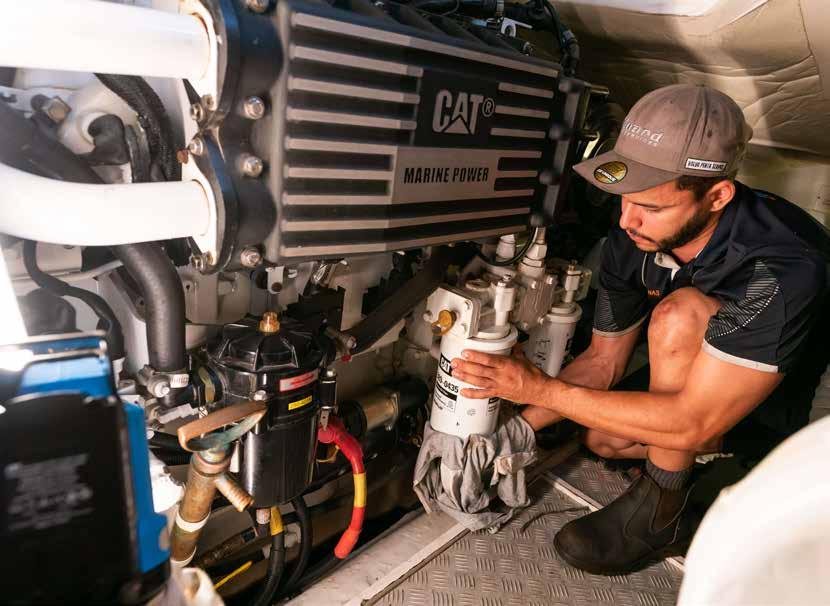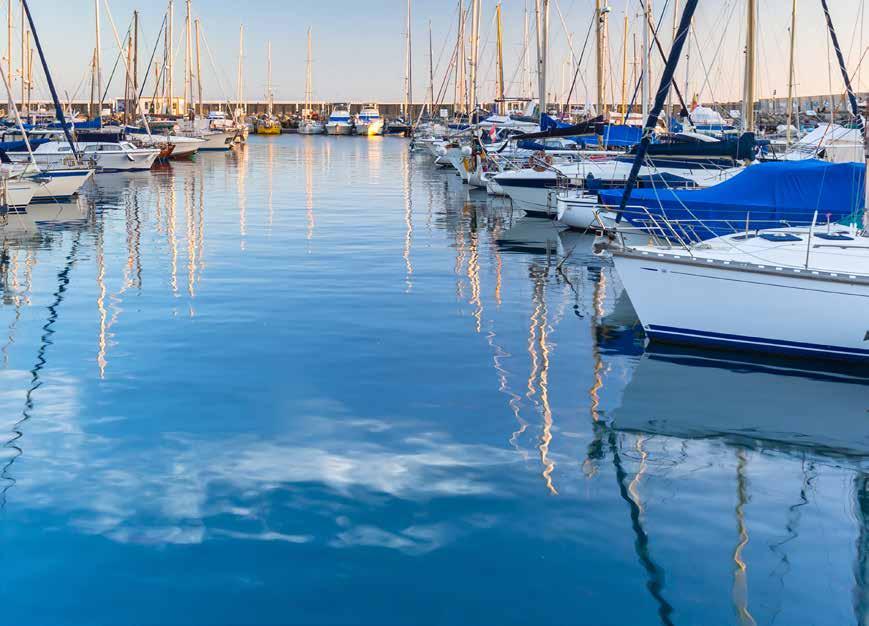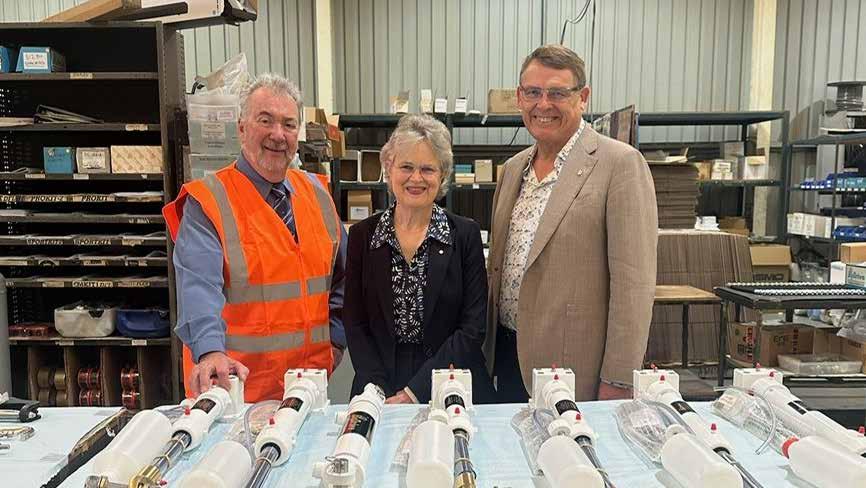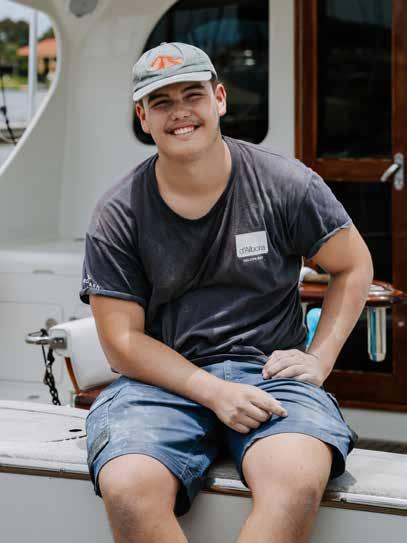
8 minute read
GET SMART THE RISE OF TECH IN MARINAS
By Jeni Bone
It’s a brave new world in the realm of marina management and service delivery, as marinas and boatyards embrace digital and physical tools to keep pace with customer expectations, reduce costs and streamline operations. But no device or database can replace the human connection, which remains the essence of the boating experience.
The evolution from analogue or manual systems to “smart” facilities involves integrating digital tools and connected, and sustainable, infrastructure to improve the customer experience, safety, sustainability, and operational efficiency. Some marinas have seized the opportunity to implement new systems, while others baulk at the costs or find they are over-engineered for their needs.
Examples of smart systems can be seen in apps and AI-driven solutions for tracking and predicting visitation trends, berth management, demand for services, availability of fuel and water and weather data, and for monitoring renewable energy, water quality and waste management.
And while automation of marina operations and digital interface with customers are proving a boon to business, the key is to keep the customer central.
Joe Lynch, ICOMIA CEO since 2023, views the definition of “smart” in a broad sense of “the physical, human and digital infrastructure that improves the customer experience and makes the marina more successful”.
“These innovations and initiatives can benefit every area of operations, such as marina planning, berthing space, managing income streams, staffing, safety and resource management such as refuelling and charging, and predicting peak loads.”
Then there are the marketing opportunities to offer customers more access to amenities and make the marina easier to find and easier to book.
“It makes good business sense,” Joe explains. “There is the universality of devices and people are becoming accustomed to using apps, QR codes and devices.
“Apps and online systems make it easier for visitors and members in the case of a yacht club to book a berth, order provisions and fuel, book the restaurant, or send an enquiry about service or maintenance.
“It’s all there in the palm of your hand,” he says, referring to the smart phones and tablets most people carry. “If you can save people time and reduce the stress in the process, they will enjoy the experience more.”
What’s imperative to remember, though, Joe emphasises is that marinas and the broader boating industry are in the “people business”.
“We are fortunate to occupy the space at the intersection of transportation and hospitality. Boating is about fun. The marina industry is catching up with the hospitality industry and it’s an exciting ride!”
And while the investment and expertise required to introduce such technology could seem like a barrier to adoption, according to Joe, “marinas can’t afford not to keep up”.
“We encourage marinas to embrace it. Technology can boost productivity, revenue and sustainability. There are sensor systems for water quality, temperature and wave height and on board vessels or dockside, to monitor for spills and fire so that the team can react quickly to any emergencies.
“By monitoring changes in coastal conditions, we can understand and predict the impact of weather systems, and as a result, design and build more resilient marinas that are better prepared for the future.”
One example of investment in systems that reap rewards for marinas and benefit their customers is D-Marin’s introduction of Smart Sensor technology supplied free of charge to more than 10,000 customers.
The D-Marin network comprises 26 marinas in the Mediterranean and UAE.

Powered by the Sense4Boat platform, D-Marin’s Smart Sensors deliver round-the-clock monitoring and instant alerts for risks including water ingress, battery overheating, fire, and unauthorised movement. Installed in over 10,000 vessels to date with more than 90 percent of eligible customers already onboard the technology has quickly become a trusted tool in proactive boat care.
Testimonials from marina staff and boat owners convey the array of threats such technology has averted.
On the Gold Coast, The Boat Works places a high priority on being a “smart yard”, investing in integrating technology to streamline operations.
Along with the purchase of a sixth machine – a variable width 100-Tonne Marine Travelift – they have automated their booking system to process arrivals and will soon add a centralised dashboard for yard arrivals and departures, and an integrated meter to track and record power and water usage. In addition, the two yards have a comprehensive site surveillance to monitor marina movements.
“Our customers expect the same tech convenience as they get in everyday life, so we attempt to make the process easier with smart applications,” commented Shane Subichin, Marina Manager.
“We are using our smart integrations to lead the way in environmental compliance, such as the Fox Evo-System, a 3-stage process that aids in stormwater diversion and wastewater treatment – a benchmark for sustainable marina infrastructure in Australia.”
In terms of benefits for The Boat Works, there are the positives of energy savings, reduced expenses and increased staff productivity.
“The adoption of solar panels, water harvesting and filtration systems supports sustainability and reduces costs. Automating many of our processes means staff are able to focus on enhancing the customer service experience.”

With new systems for booking, reservations and payments, gains for customers include improved efficiency, which equals more time on the water.
Barriers to implementing both the physical and digital systems, aside from the personnel and expertise required to set the train in motion, could be the initial set up costs, the disruption to operations, and what Shane calls “the training and teething period”.
“But it’s certainly worth it as far as the improved customer experience, the time and cost savings and streamlining procedures and systems so everybody is on the same page,” added Shane.
David Osmond at Gladstone Marina, gateway to the southern Barrier Reef, has introduced several digital systems for customer service and marina management.
“We use a few different apps to manage events, maintenance, daily checks, catering, safety and berthing,” he said. “It makes a lot of difference in time and the amount of paperwork we used to have. Digital tool is much better than hundreds of pieces of paper you have to file and store, and is easier to search and reference”
In addition to the Power BI Web cloud-based business platform, they use Pacsoft Marina Management software which automates daily operations, simplifies billing and financials, manages berths and reservations with a visual map, and provides reporting tools.
“This automates our berthing, booking, leasing and scheduling, and facilitates communication with customers, sending them a confirmation email, a welcome email and departure email.
“But we make a point of phoning them when we get an enquiry through the website – it’s friendlier.”

The Gladstone Marina Guide is available in digital and print format, outlining the facilities on-site and in the region, with QR codes linking to further information.
In NSW, Addenbrooke Group has a diversified portfolio of six marinas and a unique perspective on what makes sense when it comes to “smart” initiatives.
As Ned O’Neill, director at Addenbrooke, explained, “It depends what your marina does and who your customers are as to which ‘smart’ features are appropriate.”
Their six marinas include four on Sydney Harbour, one at Berowra and the other at Koolewong, which among them have 250 berths, 158 swing moorings and 24 tenancies.
“Our marinas don’t have a lot of visiting vessels – they’re not tourist destination marinas,” Ned continued. “We experimented with some apps but received very low engagement. We’re pretty analogue; we use a spreadsheet system and make sure the customer experience is excellent. It’s a case of ‘if it ain’t broke . . .”
Smart systems are ideal if you’re running a floating hotel model with a high turnover of berths, Ned asserted. “There are great options for systems and software. But for us, so far, they provide too much functionality that we just wouldn’t use.”
When it comes to safety, staffing and management plans, Ned is a big supporter of the BIA’s open-source templates.
“For regulatory and landlord functions, the BIA provides a range of maintenance plans, lease templates, environmental plans and other generic documents. These are available free of charge to help small operators.”
Artificial Intelligence (AI) and its advanced functions has its appeal as well. “Every five years we update our management plans and we have used AI to generate the basis, then we overlay our site-specific requirements. It saves a lot of time, and with human oversight, is a reliable source of information.”
Among its 13 or so working groups, ICOMIA (International Council of Marine Industry Associations) formed the Smart Marinas Working Group in 2019 precisely for this purpose: “to respond to the technological developments that enhance efficiency and seamless user experiences”.
The group is focused on developing recommendations and guidelines for marinas, along with keeping at the forefront of new tools and processes for implementing digital transformation.
“The guide is downloadable from the ICOMIA site and through the BIA in Australia, available to members and non-members free of charge,” Joe states, adding that it has been compiled with no commercial bias or agenda.
Rather than focusing on specific technology, the guide describes the Smart Marina concept as the digital platforms and physical data collection sources that provide a “big picture” view of a marina and its links with its community. This interconnectivity, a “living network”, enables marinas to optimise operations through adjusting to dynamic factors, resulting in more efficient processes and procedures. Ideally, staff are freed up for the face-to-face personal service that is so crucial to success in business as in life.
“After all, that’s what unites us all in the marine lifestyle – this shared passion for the water, sharing time with friends and family. Technology is the means for enhancing our experiences, but the human element is still essential.”
Keen advocate of the human over hardware approach, Darren Vaux, Director and co-owner of Empire Marinas brings his experience to the topic of digital transformation. Darren is the past-President of ICOMIA, and was formerly Vice President, on the Board for seven years and Australia’s representative for 15.
Both Empire Marinas – the 200-berth Bobbin Head marina and Lake Macquarie, which has 250 berths – have embraced tools such as CCTV cameras, sensors, systems for marina cont p10 management such as BIA’s Access Management System which supports Marine Card and apps for work-flow and efficiency, but at the heart of every initiative has been “the why”, as Darren explains.

“Beyond buzz words, we have to look at two aspects: the operational functionality of the marina and the client expectation and experience,” he states.
“You can use chatbots and AI for 24-hour interface, but ask yourself, has that technology improved your experience of supermarkets, airlines, phone companies? Digital transformation does not mean self-service, or no service at all. Technology needs to be invisible and the customer experience seamless. People want to deal with human beings.”
The majority of Empire Marina berth holders are permanent and belong to older owners, which influences the choice of communication channels. Darren also heads membershipbased boat sharing service, Freedom Boat Club Broken Bay and Lake Macquarie, which attracts a younger clientele more receptive to apps and digital interface.
“Our complete focus is the wants and needs of our customers,” Darren continues. “We are developing apps so that our customers can access information 24/7 and use AI to assist when the office is closed, but it’s not the primary or sole point of contact.”
Digital resources have streamlined marina operations and ensured there is no “guru” who is the keeper of the codes! “Our team has the tools to keep them highly informed, to monitor trends and behaviours and respond to them. All CRM records are digitised so we have the entire history of our customers accessible to all staff, which improves efficiency and the customer experience.”


Boating is an essentially analogue experience, he notes. “Boating is an enrichment to our lives. A hands-on connection to nature and all the benefits of ‘the blue mind theory’. The marina is where we take a breath, relax and say ‘ahhhh, yes, this is my happy place’.”







